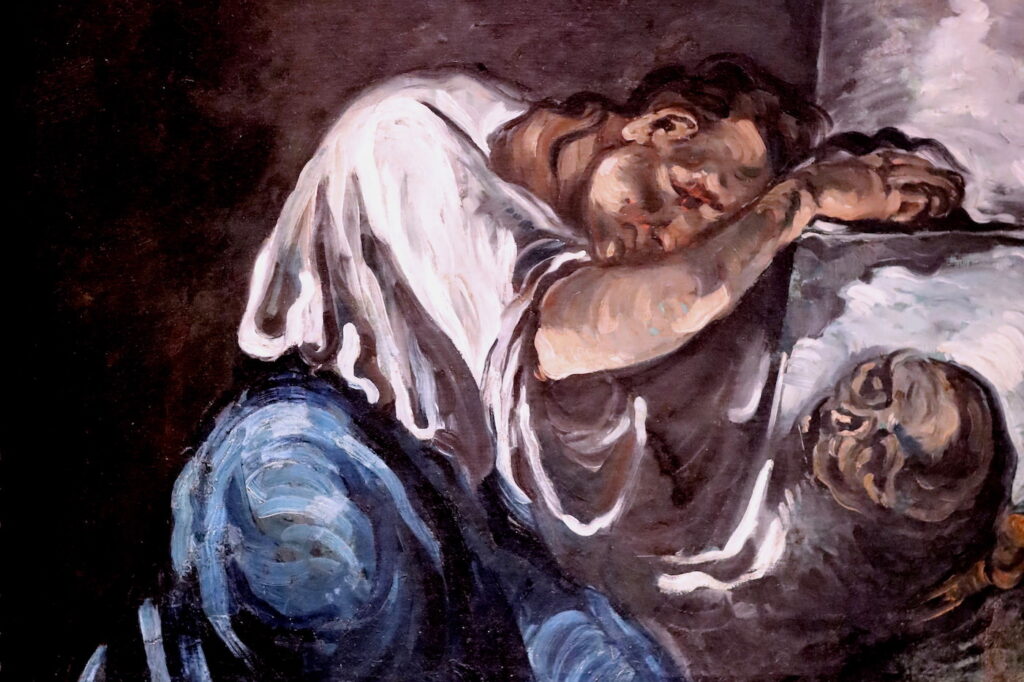“Those who do not weep, do not see.”
—Victor Hugo, Les Misérables
We are increasingly a sorrowful and lonely nation. There has been a decades-long rise in unhappiness and “deaths of despair” (suicide, drug and alcohol poisoning, and alcoholic liver disease and cirrhosis). Americans even report losing friends: according to one report, the proportion of those who claim to have no friends has quadrupled since 1990, while only a small fraction say they enjoy ten or more close friends.
The isolation and sorrow are often self-imposed. We bow our heads in wretched submission to our smartphones, withdrawing from those next to us who are similarly stooped. Americans’ absorption in the digital space of online interests has, in many ways, become a retreat from an always challenging but potentially invigorating relationship with reality.
Start your day with Public Discourse
Sign up and get our daily essays sent straight to your inbox.This kind of flight from sorrow is an all too easy option. It is particularly attractive in a world infatuated with usefulness, efficiency, and entertainment. Sorrow, after all, can lead to resignation, emotional excess, and even outbursts of anger; it hardly seems to be an appropriate feeling for a hyper-productive or pleasurable life. We don’t feel that we have the time to acknowledge our sorrow. We instead stay busy, anxious, and constantly stimulated by our technologies.
This is a mistake. There is a rich world to be gained by embracing our sorrow.
Acedia vs. Virtuous Sorrow
Aquinas wrote in detail about the sin of acedia (or sloth), which he defined as a kind of sorrow that makes one reluctant to grow closer to God. Ultimately, acedia leads to flight from our purpose of eternal union with God, from the joy of charity as a spiritual virtue. The fourth-century Desert Fathers and fifth-century monastics catalogued the symptoms of acedia, including melancholy, boredom, drowsiness, and agitation. Acedia can also breed a more active kind of restlessness: according to John Cassian, acedia is “weariness or distress of heart” that not only makes a monk sluggish but also “produces dislike of the place, disgust with the cell, and disdain and contempt of the brethren who dwell with him.” Cassian taught that such temptation to flee the monastery must be resisted with perseverance and staying in one’s place. Aquinas pointed to honoring the Sabbath day as an alternative to acedia. The Sabbath means we rest, cultivate stillness of the mind and body, and contemplate the divine call to our ultimate destiny.
Acedia is disordered sorrow, but sorrow isn’t always disordered. Sorrow over something that is morally wrong or over affliction is a fitting response, and therefore a good passion. Shame is also a kind of sorrow. When we are ashamed about wrongful behavior, we feel a sorrow that’s painful but ultimately can move us to be better people. Sorrow over someone else’s distress is also the motivation for mercy.
Sorrow, therefore, may even be called virtuous if it leads to a correct perception of an evil and a willful rejection of it. As Aquinas writes: “Now every virtuous good results from these two things, the rectitude of the reason and the will.” It is the rational alignment of our sorrow with our intellect and will that makes it good.
Sorrow over something that is morally wrong or affliction is a fitting response, and therefore a good passion.
Listening to the Heart
However, part of the reason it’s so difficult for sorrow to become virtuous is that we tend to denigrate the movements of the heart. Theologian Dietrich von Hildebrand claims in his 1965 book The Heart: An Analysis of Human and Divine Affectivity, that we need to assign equal dignity to the heart as an independent center at the core of our human nature. Unlike Aquinas and Aristotle before him, von Hildebrand does not relegate the passions to the level of merely animal characteristics; he argues that emotions suffer from excesses like fanaticism and sentimentality, but can also bring us to the spiritually sublime—such as “holy joy” and contrite sorrow for one’s misdeeds.
Why then are the emotional powers of the heart so deprecated and dismissed when they are so crucial to human life and spirituality? In the case of sorrow, Christians need only consider the suffering of Jesus and its very poignant description in the Bible; they also share with the Jewish tradition the laments of the Psalms and the Book of Lamentations.
Tender emotions associated with love or sympathy—including sorrow—are often despised as weak, irrational, or hysterical. Yet these gentle but intense emotions often accompany excellence in the will and intellect.
As von Hildebrand demonstrates in a masterly analysis, it is the most tender of emotions that are attacked severely. Since World War I, the dry intellectualism of movements of thought and culture—logical positivism, scientism, psychologism, functionalism—have repeatedly sought to subdue or control the emotions in a way that tethers them to the rigorous standards of experimental, deductive, or practical purity. These philosophical developments have meant that bold emotions associated with things like courage, ambition, and lust for power are viewed favorably because of their efficacy. The bold emotions are considered to be “energetic” and focused affections that represent strength and virility. But tender emotions associated with love or sympathy—including sorrow—are often despised as weak, irrational, or hysterical. Yet these gentle but intense emotions often accompany excellence in the will and intellect.
The Fruits of Sorrow
Our cultural attitude toward tender emotions like sorrow is a mistake. As a basic feature of human life and a key component of any ethics, sorrow is not something that can be fruitfully suppressed or ignored. There are ways to overcome sorrow—or better, to live in and through it. The great Sufi poet Rumi even suggested that sorrow may be a path to something much greater:
Sorrow prepares you for joy. It violently sweeps everything out of your house, so that new joy can find space to enter. It shakes the yellow leaves from the bough of your heart, so that fresh, green leaves can grow in their place. It pulls up the rotten roots, so that new roots hidden beneath have room to grow. Whatever sorrow shakes from your heart, far better things will take their place.
So the question is how we sorrow, not whether. What kind of sorrow can bring us closer to achieving our purpose as human beings? As the apostle Paul taught, the person of “flesh” can rejoice even in one’s natural sorrow “since you have taken off the old self with its practices and have put on the new self, which is being renewed, for knowledge, in the image of its creator” (Colossians 3:9; see also Galatians 5 and Ephesians 4:22–24).
To find fulfillment in sorrow, we must transcend our slothful and anxious selves by embracing our spiritual nature (integrated with the body) that coordinates our emotions, intellect, and will. Sorrow then becomes a virtue and a source, ultimately, of joy.
We must choose how we carry our sorrow. As discussed earlier, Aquinas wrote that acedia is a kind of sorrow that’s insensible to the divine good. Acedia stems from a person’s commitment to remaining in the flesh—in the effortless, unchanging, and morally unconscious mode of the natural person that von Hildebrand warned us against. To find fulfillment in sorrow, we must transcend our slothful and anxious selves by embracing our spiritual nature (integrated with the body) that coordinates our emotions, intellect, and will. Sorrow then becomes a virtue and a source, ultimately, of joy.
Sometimes the first step to embracing our spiritual nature is deceptively simple. As Thomas Aquinas counseled in the thirteenth century and as self-help gurus remind us today, simply engaging in some focused activity, whether it’s thoughtful contemplation of the divine mysteries or a hot bath, can help us emerge from acedia. Even a walk around the block can help us immerse our attention in the world and all its strangeness, chaos, and beauty. Loving, conscious attention enables us to see our surroundings. Immersion in something external to us isn’t meant as a way to escape or suppress sorrow; rather, immersion places sorrow within the broader contexts of our lives and the world.
However, we rely on modern technology as a way to escape sorrow. The relentless, linear development of technology often supplants the union with God that embracing sorrow can help us achieve. Instead of suffering alongside those who cannot bear children, researchers are rushing headlong into new technologies for three-parent IVF, lab-grown embryonic persons from stem cells, and artificial “uteruses.” Rather than investing time and care in the most vulnerable of our society, researchers are pursuing cheaper and easier alternatives, like social media forays into mental health manipulation and robot companions for the elderly.
Another way we try to escape sorrow is to obsess over utility. If we try to be happy by focusing on usefulness, effectiveness, and efficiency, we will never develop the insight we need to attain our true end. As von Hildebrand emphasizes, echoing a tradition that goes back to Augustine of Hippo, it is through deep feeling that we see truth and beauty. Spiritually sensitive people are fully conscious of their object, fully immersed in it. Someone who is profoundly sorrowful can see life’s purpose more clearly than any practitioner of science and technical skill who is devoid of feeling.
Sorrow is ultimately not a problem to be “solved.” Those with sorrow, if stewarded properly, have the clarity and sobriety to see themselves and their world as it truly is. By accepting sorrow rather than trying to escape or suffocate it with distractions and technology, we can instead reach out, go outside, and extend ourselves in solidarity and mercy to those who cannot bear their suffering alone. Sorrow isn’t something we should, or even can, avoid, but something we must learn to accept with grace, mercy, and even joy.













